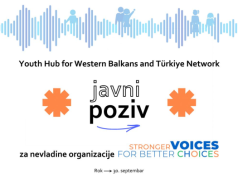 The European Fund for the Balkans (EFB) launches a call for applications within its Envisioning Europe programme strand: “THINK AND LINK” – Regional Policy Programme
The European Fund for the Balkans (EFB) launches a call for applications within its Envisioning Europe programme strand: “THINK AND LINK” – Regional Policy Programme
The programme seeks to foster inclusive and evidence-based policy making in the Western Balkans by initiating research projects which are relevant from the perspective of the Copenhagen criteria [1], embedded in a regional capacity building and networking programme cycle [2].
THE PROGRAMME IS ADDRESSED TO:
-
- emerging think-tanks
- policy oriented NGOs
- independent policy institutes
- policy relevant research groups [3]
ELIGIBILITY:
-
- Applications are welcomed from emerging think-tanks, policy oriented NGOs, independent policy institutes and policy relevant research groups from the Western Balkans that have a project portfolio focusing upon political, economical and social issues and interest in the process of EU integration.
- The applicants should be interested in capacity building and networking activities as integral parts of this programme.
- The policy programme includes projectgrants. It will not offer core funding.
- Applications must be submitted by institutions/organisation or by research groups (groups of individual researchers) affiliated with an organisation/institution with legal status.
- Each applicant may submit only one project proposal.
Grantees who have received a grant under an earlier call within this Programme are not eligible to apply again.
BENEFITS
The benefits of being selected to participate in this programme include funding for a research project, support through a capacity building and networking programme cycle and the mentorship support. This programme goes beyond providing only project grants by involving the successful applicants in 2 capacity building seminars and regional networking opportunities.
EXPECTED PROGRAMME OUTPUTS:
-
- policy papers based on sound research;
- public debate triggered by innovative, effective and efficient outreach activities;
- capacity building and training component;
SUPPORT
The European Fund for the Balkans gives grants up to a maximum of 15,000 Euros to be used for research costs, project related travel and dissemination activities.
Apart from the project grant, the European Fund for the Balkans supports successful applicants by covering participation, travel, accommodation and boarding costs related to the capacity building and networking programme activities.
APPLICATIONS
Applicants must apply for participation in the programme cycle (capacity building and networking seminars, mentoring) and submit a research project proposal on a topic relevant from the perspective of the Copenhagen criteria.
Both elements of the application (motivation to participate in the capacity building seminars) and successful research project proposal) are integral parts of the application. It is not possible to be accepted only for one part of the programme. Candidates must fulfil the criteria for both elements.
The research project proposals, dealing with a topic relevant from the perspective of the Copenhagen criteria should be focused on analysis and case studies of the in-country policies against the needs and requirements derived from the EU acquis, necessary to ensure effective and complete compliance and, based on their research, to develop concrete policy proposals, policy advice or policy options.
The project has to be implemented in the period between April 2013 and December 2013. The research period within the project should not exceed 6 months and it should be conducted in the period of April 2013 to September 2013 while dissemination period will last from October to December 2012.
Optional fields of research:
-
- specific institutions responsible for designing, monitoring or implementing the respective policies;
- specific decisions, analysing the role of the administration, civil society, the media in making these decisions;
- public policy making in specific sectors;
- profile of the countries, providing clear information on the key challenges and actors.
- stability of institutions guaranteeing democracy, the rule of law, human rights and respect for and protection of minorities;
- the existence of a functioning market economy as well as the capacity to cope with competitive pressure and market forces within the Union;
- the ability to take on the obligations of membership including adherence to the aims of political, economic & monetary union.
The EU membership criteria require that the candidate country must have achieved:
This process of transformation can take place in the areas which are identified as research topics of the Programme and correspond to the acquis communautaire (Annex 1).
The applicant can choose more than one research topic in the case these topics are thematically related and fall under the same area of research. (i.e. social policy, finance, agriculture)
The research should be undertaken from the outset with the goal of producing an impact on the public debate. The applicants are selected not only on the basis of a research plan but also on the basis of a dissemination strategy. This strategy should outline concrete steps to ensure that findings reach policy makers and the interested public (presentations, special briefings, cooperation with specific media). For that reason, the participating organisations/institutions/research groups are encouraged to prepare their final papers in English and their local language as well.
HOW TO APPLY
Applicants must complete the application form at http://balkanfund.org/grants/app/
Applications will be accepted through online system only. Applications which are not sent via online system will not be considered.
SELECTION CRITERIA:
-
- relevance of the research to national policy in relation to the Copenhagen criteria and its potential to inform and improve policy making;
- likelihood that the findings will be useful to policy makers and other stakeholders;
- soundness of the project’s conceptual framework (the ideas, concepts, theories and bodies of knowledge informing the proposed approach) and methodology;
- feasibility of the research;
- capability of the applicant organisation/institution to undertake and complete the project on schedule and its’ research record;
- soundness of the dissemination strategy;
- relevant needs and level of motivation of the applicant organisation/institution to actively participate in the whole programme cycle (including seminars, networking and outreach activities);
- appropriate project budget.
The number of grants will depend on the nature, quality and estimated budgets of applications received, with approximately 12 grants awarded per Call.
PROGRAMME HIGHLIGHTS AND KEY DATES
Application deadline: February 20, 2013
Final decisions communicated to applicants: by March 29, 2013.
Think and Link Programme duration: April 2012 – December 2012
-
- Capacity building seminar (I seminar): May, 2013.
- Research period: April – September, 2013.
- Final papers to be submitted by: September, 2013.
- Dissemination period: October – December, 2013.
- Final seminar (II Seminar): November, 2013.
For more information, please consult our programme description document.
Questions related to preparation of the application and further inquires on the programme details may be sent by e-mail to Igor Bandovic, Programme Manager, European Fund for the Balkans at igor.bandovic@balkanfund.org.
PROGRAMME BACKGROUND AND OBJECTIVES
In their democratisation and reform efforts the countries of Western Balkans are today oriented towards the goal of eventual EU accession, even if they are at different stages in their respective relations with the EU. They face many similar problems. They can all learn from countries that have recently joined the EU.
This transfer of experiences – both in the region and from previous accession candidates – needs to be organised, however. What member-state building means in practice remains unclear to most of the political elite in the countries of the Western Balkans. It is also often little understood by the wider group – journalists, civil society representatives, academics, interest groups – who shape policy debates.
This lack of a broad and shared understanding of the Europeanisation process adds to the difficulties of building and sustaining reform coalitions. It is often made worse by a large number of competing and conflicting agendas. Therefore, countries in the region should develop strategies, plans and priorities accompanied with fostering real domestic debate and exercise ownership for achieving sustainable institution building and real transformation.
With the aim of addressing these challenges and needs, the European Fund for the Balkans provides support through programmes focused on research and policy development projects as well as media outreach initiatives, with a view to: supporting inclusive and evidence-based research and policy-making; strengthening the think tank capacity in the Balkans and in the EU regarding Balkan issues; bringing EU integration into public perception; linking emerging policy institutes from the Balkans with EU-based think tanks and stimulating regional exchanges and transfer of know-how within the wider region.
Annex 1
Research topics of the Programme:
During the process of the enlargement of the European Union, the acquis [4] was divided into 31 chapters for the purpose of negotiation between the EU and the candidate member states for the fifth enlargement (the ten countries that joined in 2004 plus Romania and Bulgaria which joined in 2007).
For the negotiations with Croatia and Turkey, the acquis was split up into 34 chapters instead, with the purpose of better balancing between the chapters: dividing the most difficult ones into separate chapters for easier negotiation, uniting some easier chapters, moving some policies between chapters, as well as renaming a few of them in the process. These chapters are identified as research topics for the Think and Link Regional Policy Programme 2011:
-
- Free movement of goods
- Freedom of movement for workers
- Right of establishment and freedom to provide services
- Free movement of capital
- Public procurement
- Company law
- Intellectual property law
- Competition policy
- Financial services
- Information society and media
- Agriculture and rural development
- Food safety, veterinary and phytosanitary policy
- Fisheries
- Transport policy
- Energy
- Taxation
- Economic and monetary policy
- Statistics
- Social policy and employment (including anti-discrimination and equal opportunities for women and men)
- Enterprise and industrial policy
- Trans-European networks
- Regional policy and coordination of structural instruments
- Judiciary and fundamental rights
- Justice, freedom and security
- Science and research
- Education and culture
- Environment
- Consumer and health protection
- Customs union
- External relations
- Foreign, security and defence policy
- Financial control
- Financial and budgetary provisions
- Institutions
[1] In 1993, at the Copenhagen European Council, the Union took a decisive step towards the fifth enlargement, agreeing that “the associated countries in Central and Eastern Europe that so desire shall become members of the European Union.” Thus, enlargement was no longer a question of ‘if’, but ‘when’. Concerning the timing, the European Council states: “Accession will take place as soon as an associated country is able to assume the obligations of membership by satisfying the economic and political conditions required.” At the same time, it defined the membership criteria, which are often referred to as the ‘Copenhagen criteria’.
[2] This programme offers more than a reserach grant by including a capacity building and networking component. It is especially targeted at emerging organisations or junior reserachers/groups who seek such an opportunity.
[3] Research groups should consist of at least two researchers and be affiliated with a university, research institution or other type of legal entity based in the region of Western Balkans. Applicants should supply the details on legal status of the supporting legal entity with the application package to the European Fund for the Balkans Secretariat.
[4] The term acquis communautaire, or (EU) acquis is used in European Union law to refer to the entire body of legislation of the European Communities and Union. Applicant countries must accept, adopt, implement and enforce the acquis before they can join the EU.











